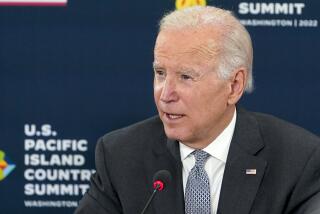Bush to Stress Economics Over Politics in Asia
- Share via
WASHINGTON — When President Bush leads a group of American business executives to Asia later this month, his trip will mark a role reversal for the United States and its Asian allies.
For the first time, the United States will concentrate on economics, pressing Japan and other Asian nations for concrete concessions that could mean new jobs for Americans.
And for the first time, Asian countries--which for decades have been admonished by American leaders to avoid a narrow economic focus and think instead about broader foreign policy questions--will urge the United States to look at the bigger picture.
Bush’s business delegation should not concentrate exclusively on economic disputes between the United States and Japan but rather on “the importance of our global partnership,” said Hiroshi Hirabayashi, deputy chief of mission at the Japanese Embassy in Washington.
He warned last week that U.S. officials and business leaders should not resort to “hastily arranged pressure-exercising activities” in an effort to reduce the U.S. trade deficit with Japan.
Asian leaders acknowledge that the stumbling U.S. economy and Bush’s recent vulnerability in the polls have altered the character of the President’s trip to Asia.
“There’s a lot of delicate diplomacy, especially with Japan,” one Asian diplomat said. “I don’t think the American public will be satisfied with a speech (by Bush) in Tokyo and a handshake with (Japanese Prime Minister Kiichi) Miyazawa. . . . If he’d gone in November, it would have been different. Now, he has to show that this trip has something to do with securing exports for American business.”
Bush’s trip was originally scheduled for early November but was postponed on the night before the November elections, when the President said he needed to concentrate on domestic issues. On Election Day, Democrat Harris Wofford won a surprise victory in a U.S. Senate race in Pennsylvania after a campaign criticizing the Administration for failing to protect American jobs.
When the trip was rescheduled to begin Dec. 30, the White House announced that Bush would bring about 20 American business leaders with him on the visit to Japan, South Korea, Singapore and Australia. Never before has an U.S. President carried a private business delegation with him on his overseas travels.
“This is a first, and I think it will send a message,” Commerce Secretary Robert A. Mosbacher told reporters Friday. While he said the purpose of the trip was “not really to beat on anybody,” he said the American business leaders will join with Bush in meetings with foreign government leaders on economic matters.
In the past, it was considered beneath the dignity of Presidents to make a pitch overseas for specific American companies or business executives. “This is a sign of our weakening economic position,” said Clyde Prestowitz of the Economic Strategy Institute and a former U.S. trade negotiator. “We’re recognizing the importance of business, and that’s good.”
Although there has been some criticism, supporters point out that Bush is merely imitating the actions of other foreign leaders, including former British Prime Minister Margaret Thatcher and French President Francois Mitterrand.
When Mitterrand visited Singapore a few years ago, a diplomat recalled, the Singaporean officials who greeted him were prepared to discuss foreign policy and international strategy, such as Indochina. Instead, Mitterrand spent most of his time trying to sell French subway cars to the Singapore government.
Now Asian leaders realize that it will be Bush’s turn to play the role of America’s top salesman. “We expect Mr. Bush to lobby for contracts,” a Singapore diplomat in Washington acknowledged this week. “So there is a new dimension to this trip altogether. The whole politics of the trip is not so much foreign policy as (U.S.) domestic concerns.”
The Bush Administration broke the longstanding taboo on high-level business lobbying in 1989 during Vice President Dan Quayle’s first trip to Asia. While in Indonesia, he pressed senior officials there to grant a contract for telecommunications equipment to American Telephone & Telegraph. In Bangkok, he complained that the Thai government was unfairly preventing an American company, Guardian Industries, from producing glass in Thailand.
Earlier this year, Quayle took the unprecedented step of inviting a delegation of private U.S. businessmen to Latin America with him.
Bush’s business delegation will include the chief executives of the three leading American automobile manufacturers: Lee A. Iacocca of the Chrysler Corp., Harold A. Poling of Ford Motor Co. and Robert C. Stempel of General Motors Corp.
Mosbacher said Bush limited the delegation to those heading “a major industry grouping” or an industry-government association. “There were lots and lots of people who wanted to (participate), who unfortunately we couldn’t include,” he said.
More to Read
Get the L.A. Times Politics newsletter
Deeply reported insights into legislation, politics and policy from Sacramento, Washington and beyond. In your inbox twice per week.
You may occasionally receive promotional content from the Los Angeles Times.










